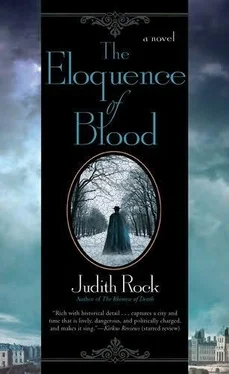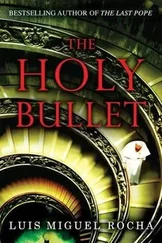Judith Rock - The Eloquence of Blood
Здесь есть возможность читать онлайн «Judith Rock - The Eloquence of Blood» весь текст электронной книги совершенно бесплатно (целиком полную версию без сокращений). В некоторых случаях можно слушать аудио, скачать через торрент в формате fb2 и присутствует краткое содержание. Жанр: Исторический детектив, на английском языке. Описание произведения, (предисловие) а так же отзывы посетителей доступны на портале библиотеки ЛибКат.
- Название:The Eloquence of Blood
- Автор:
- Жанр:
- Год:неизвестен
- ISBN:нет данных
- Рейтинг книги:5 / 5. Голосов: 1
-
Избранное:Добавить в избранное
- Отзывы:
-
Ваша оценка:
- 100
- 1
- 2
- 3
- 4
- 5
The Eloquence of Blood: краткое содержание, описание и аннотация
Предлагаем к чтению аннотацию, описание, краткое содержание или предисловие (зависит от того, что написал сам автор книги «The Eloquence of Blood»). Если вы не нашли необходимую информацию о книге — напишите в комментариях, мы постараемся отыскать её.
The Eloquence of Blood — читать онлайн бесплатно полную книгу (весь текст) целиком
Ниже представлен текст книги, разбитый по страницам. Система сохранения места последней прочитанной страницы, позволяет с удобством читать онлайн бесплатно книгу «The Eloquence of Blood», без необходимости каждый раз заново искать на чём Вы остановились. Поставьте закладку, и сможете в любой момент перейти на страницу, на которой закончили чтение.
Интервал:
Закладка:
“Tito?” She drew in a quick breath and looked up, seeming to see La Reynie and Charles for the first time. “My Tito? Where is he?”
Charles said softly, “When did you last see Tito?”
“Thirteen years ago. Only once. Soon after he went to be a servant, I was sent to see how he did. He was eight years old then.” She sighed. “I missed him sorely. But it was best for him; it was a place and a way into the world.” The nun stared into the distance, her pale lips moving in prayer or memory, Charles couldn’t tell. The child in her lap had sucked the rag dry and began to wail before she sighed and said, “Thirteen years ago he went to Madame Anne Mynette. Such a long time.”
“Madame Anne Mynette?” Charles said mildly.
“So she called herself four years before, when she came looking for her own child. I doubted then she had a right to the title,” the nun said acidly. “Women who come here to retrieve their babies-not that many ever come-hardly ever have a right to it.”
La Reynie raised an eyebrow at Charles. “It seems a long time for you to remember the woman’s name,” he said skeptically, watching her soak the rag again and quiet the baby.
“Oh, no, when she came in search of a little servant, I remembered her. Why would I not, when I’d already given her one of our babies?”
Charles frowned in confusion. “But you just said that when she came earlier, it was to get her own child.”
“Her own child had died.”
“Died? But-”
Soeur Mariana bridled. “I remember quite well how it was. A wet nurse left the child, because her own children had fallen ill, and she feared the infant would too. The infant she brought to us did sicken, and when ‘Madame’ Mynette came, it had just died. But I saw a chance for another child.” She made a derisive little sound. “Babies look much the same when they’re very young. And ‘Madame’ Mynette had told me that she hadn’t seen her child for some weeks. So I found a baby girl about the same age and with the same color eyes, though lighter hair. I wrapped her in a clean blanket, but then I was afraid the Mynette woman would see the difference and I would be in grave trouble. But God used little Tito to show me what to do. Tito was with me that day-I often kept him with me, though he lived in the older children’s house by then. Well, that day he was playing with the little trinket he had, a heart on an old ribbon. He’d always had it. It was around his neck when he was found in Notre Dame.” The nun’s face softened and she shook her head sadly. “His mother no doubt put it on him when she left him in the stone cradle that’s been there time out of mind for leaving babies in. So I-”
“Wait, ma soeur! Tito’s mother? But Martine Mynette told her friend that Mademoiselle Anne Mynette had put it on her when she was a baby!”
“Nothing of the kind.” Soeur Mariana gave Charles a shrewd look. “The Mynette woman was desperate with guilt when she came searching for her infant. Guilt for leaving her with the wet nurse, I suppose. Well, she deserved guilt, if a woman has a child, she should feed it with the breasts God gave her. If she told the girl that she’d given her the heart, it was no doubt to make herself seem a better mother.”
Charles’s head was spinning. “Tito’s mother,” he murmured, trying to make sense out of what he was hearing. “So the baby Mademoiselle Anne Mynette took home was a foundling like Tito himself.”
“Yes. Left on the Pont Neuf, if I remember rightly. Du Pont-from the bridge-we would have given her for a surname.”
Charles’s heart contracted as he tried to imagine young, desperate mothers, newborn children in their arms, watching to see that they were unobserved, putting their babies down somewhere that seemed safe. And walking away.
“The mothers often leave some trinket,” the nun said. “They think they’ll come and claim the baby, but they don’t. They’re whores, most of them.”
“So you are saying, ma soeur, that you took Tito’s necklace and put it on the baby who became Martine Mynette.”
“I thought the Mynette woman would be more likely to accept the child as hers, if I said I’d put the little heart on her baby when the wet nurse left her, to be sure she wasn’t mixed with the others and lost.” Soeur Mariana smiled complacently. “‘Madame’ Mynette made us a very large gift for that.” She rose and laid the sucking child in one of the beds, ignoring its cries when she pulled the rag from its mouth. Then she went to a different bed and busied herself with another infant.
Charles looked at La Reynie. The lieutenant-general looked like he was holding himself in the chair and in the room by main force.
Charles said, “What did Tito do, ma soeur? When you took his necklace?”
“Do?” Soeur Mariana sat down with the new child and soaked the rag again. “Oh, he cried. He even tried to kick me, but I beat him and he said he was sorry. It’s the only way with them.” She frowned, sucking her yellowed teeth. “I thought he would forget, as children do, but when I went to check on him after he was in the Mynette household, ‘Madame’ Mynette said she was going to send him back if he didn’t stop trying to steal her adopted daughter’s necklace. So I talked sharply to him and told him that if he didn’t stop, she would throw him out in the street and no one would take care of him. Tito was bright enough, he took to heart what I said, and she kept him.”
Charles swallowed hard. “Yes, she kept him.”
“Is he there still, maitre?”
“No. Anne Mynette is dead,” Charles said. “And so is the little girl you gave her.”
Soeur Mariana put the rag tit into the new baby’s mouth and stared beyond Charles and La Reynie, as though into the past, still saying nothing. Finally, with a faint sigh, she said, “Tito is dead, too, isn’t he?”
Charles hesitated. “Yes,” he said, and left it at that, because it seemed the kindest thing to do. “I am sorry.”
“Before I joined the Sisters of Charity, I was a wife,” the nun said, murmuring so that Charles had to lean closer to hear her. “We left Spain and came here. I had two children. They died, and my husband, also. So I became a nun. Little Tito came back to us from his wet nurse, and I had the charge of him at the house for the older children. But sometimes when I came here to work for a day, I brought him with me. He was like my son who died. Very like.” Her voice trailed into silence.
“Was your son’s name Tito?”
She shook her head. “They called my little foundling Jean Baptiste, because he was found on St. Jean Baptiste’s day. In Spanish that is Juan Bautisto, and I called him that. But he couldn’t say it, he could only say Tito, so that became what everyone called him.”
Charles nodded, wondering if Tito had called himself Jean after he left the Mynette house because he wanted to be a man, called by a man’s name, and not just little foundling Tito.
The nun was looking down at the child in her lap. “I only wanted to give another child a chance at life. So many die before we can even find them wet nurses.”
“The baby you put Tito’s necklace on had time to grow up, ma soeur. With a mother who loved her as her natural daughter.”
She gave Charles a bleak smile. “That is something, then.”
A sound from La Reynie made Charles turn to see him emptying his purse onto the table beside the basin of milk. “For the children,” he said through stiff lips, and left the room.
Hurriedly, Charles thanked the nun and gave her the last of the coins from Le Picart’s purse, made the sign of the cross over the babies, and caught up with La Reynie in the courtyard. When they reached the carriage, La Reynie dismissed it.
Читать дальшеИнтервал:
Закладка:
Похожие книги на «The Eloquence of Blood»
Представляем Вашему вниманию похожие книги на «The Eloquence of Blood» списком для выбора. Мы отобрали схожую по названию и смыслу литературу в надежде предоставить читателям больше вариантов отыскать новые, интересные, ещё непрочитанные произведения.
Обсуждение, отзывы о книге «The Eloquence of Blood» и просто собственные мнения читателей. Оставьте ваши комментарии, напишите, что Вы думаете о произведении, его смысле или главных героях. Укажите что конкретно понравилось, а что нет, и почему Вы так считаете.












